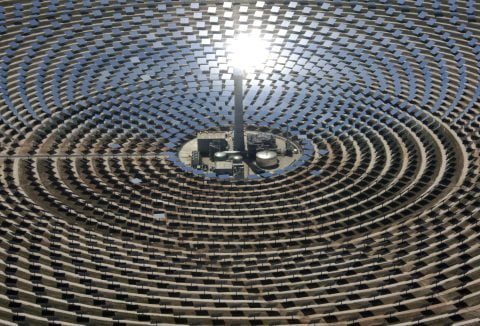A 250-megawatt solar project planned for federal land just east of the Coachella Valley will sell its power to Pacific Gas and Electric Company, providing the Northern California utility with enough electricity for more than 80,000 homes
PG&E announced Monday that it has contracted with NextEra Energy Resources to buy the power from the company’s Genesis solar project, two solar thermal plants of 125 megawatts each to be located about 25 miles west of Blythe near Interstate 10.
Palm Desert attorney Jim Ferguson, who represents NextEra locally, said the company plans to spend about $1 billion on the project, which should generate 1,000 jobs at the peak of construction and 100 long-term jobs.
The agreement with PG&E adds another layer of financial stability to the project, said Ferguson, who also is a Palm Desert city councilman.
“It is a 99 percent surety this (plant) is going to get built,” he said.
The first of the Genesis plants is scheduled to come online in 2013 and the second in 2014, PG&E officials said.
NextEra is affiliated with Florida Power & Light Company, one of the largest power companies in the United States. NextEra also owns a group of seven solar thermal plants in the Mojave Desert, collectively known as the Solar Electric Generating Systems facilities.
PG&E also announced it will buy another 250 megawatts of power from a plant that Abengoa Solar, based in Colorado, is building at Harper Lake in San Bernardino County.
Fong Wan, PG&E’s vice president for energy procurement, said the two projects “will serve the critical energy needs of our customers without creating heat-trapping gases that harm our environment.”
The Genesis project is one of four located on about 202,000 acres of federal land between Joshua Tree National Park and Blythe — called the Riverside East solar zone — that the federal government has on a fast-track schedule for approval by early December 2010.
U.S. Secretary of the Interior Ken Salazar and Gov. Arnold Schwarzenegger signed a memorandum of understanding earlier this month setting an aggressive timeline to ensure Genesis and other fast-track solar projects meet the approval deadline.
The projects must begin construction by Dec. 1, 2010, to qualify for part of $15 billion in federal economic recovery funds, according to the memorandum.
The next due date on the schedule is Nov. 4, when the California Energy Commission is set for a second review of the Genesis application, which it returned to NextEra for more information.
If the commission rules that the application is complete, a hearing and site visit should be scheduled for no later than Nov. 19, according to the memorandum’s time line.
Percy Della, a spokesman for the commission, said the time and location of the hearing and site visit would not be set until the application is ruled complete.
“Data adequate starts the official clock,” Della said.











